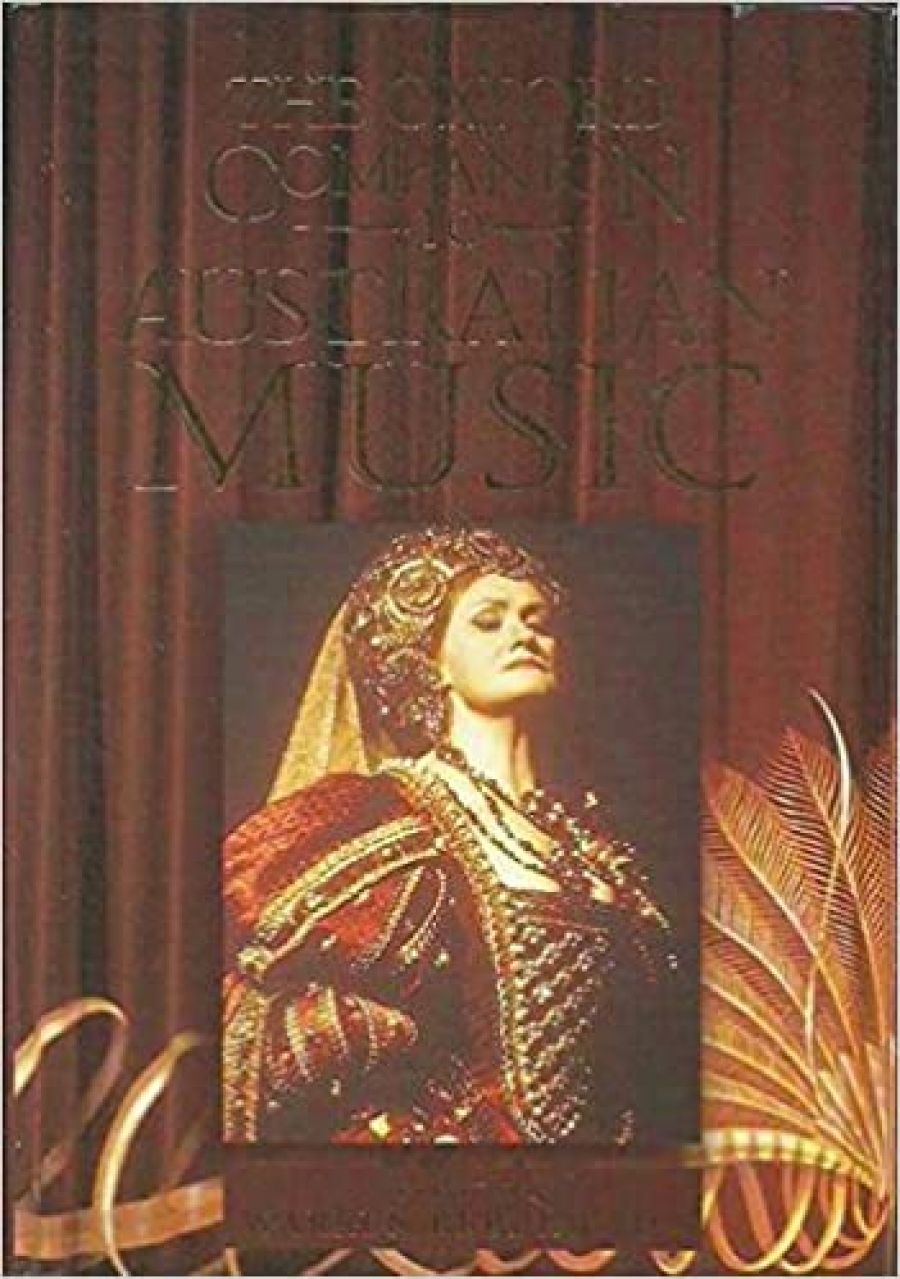
- Free Article: No
- Contents Category: Music
- Review Article: Yes
- Online Only: No
- Custom Highlight Text:
Twenty-five or thirty years ago, when it was still fashionable to speak of the Great Australian Emptiness, we took this image of the geographical dead heart of Australia as implying a cultural emptiness as well, a suggestion that too little had happened or been made here to give the mind, the civilised mind, anything to hang on to, identify with or make its own.
- Book 1 Title: The Oxford Companion to Australian Music
- Book 1 Biblio: Oxford University Press, $79.95 hb, 608 pp
Part of that richness of production was a musical one, but that form of richness is less easy to reproduce or make real than furniture or tree-planting; we can hardly expect to hear, either in performance or on record, any of the large number of operas that were written and performed here in the nineteenth and early twentieth centuries: Henry Kowalski’s Vercingotorix, for example, of 1881, Marshall-Hall’s Aristodemus, 1902, Stella, 1910, Romeo and Juliet, 1912, or any of the operettas of Moritz Heuzenroeder. Nor are we likely to hear much from the vast local repertoire of the Liedertafeln that from1850 on contributed so much to the musical life of Adelaide, Melbourne, Sydney and Brisbane, but also of smaller places like Goulburn, Tanunda, Gisbourne, Broken Hill, Cairns and Koolgardie. One of the ways The Oxford Companion to Australian Music makes itself useful is by recording the existence of all this musical activity. It fills in the picture of a life in Australia, a daily reality, that we know too little about and have only fitfully imagined, suggesting a community of interest and an enjoyment of this most portable but ephemeral of the arts that endows the life of Australians back there with a richness we do not always emphasise and qualifies the picture we have been given of earlier Australians as mostly rough and ready and with no time for frills.
Of course, all of us will want to test the Companion with reference to our own musical history. Mine progresses from the Boomerang Songbook (not mentioned) that my sister and I bought each week, through Tex Morton, the male impersonator Jenny Howard, seen almost weekly at the Royal, and Evie Hayes at the Cremorne, to the Queensland String Quartet, given only the briefest mention here, though it was led by the great Ernest Llewellyn and introduced a whole generation of young Queenslanders to the finest chamber music. I first heard it play Mozart’s Eine Kleine Nachtmusik at West End State School in 1945 and was immediately hooked. As part of my University orientation week in 1951, they played both the Debussy and Ravel quartets in a performance I have never forgotten. In 1946 it was Gladys Moncrieff in The Merry Widow, Rio Rita, Maid of the Mountains, and Victoria and Her Hussar, a concert performance of Carmen and then the QSO under Clive Douglas, accompanying Solomon; then John Manifold’s at Wynnum on most Sunday afternoons and the discovery of bush ballads. A mixed musical diet, most of it recoverable in these pages, though not, I notice, Shirley Abicaire and her zither, whom I heard every Tuesday night on ‘Take It From Here’.
The omission on Shirley Abicaire bodes ill for the hundred and fifty or more pop groups of the last twenty years that make up a goodish number of the entries here. There are too many of them. But there are good entries on the different forms and regions of Aboriginal music, on migrant music, instrument-making, folk music, on the orchestras and chamber groups and opera companies, and excellent pieces on music in each of the capital cities, where local variation is recorded in the influence in Brisbane and Queensland generally, for example, of Welsh choral singing and the eisteddfod tradition brought to the area by the large number of Welsh miners.


Comments powered by CComment